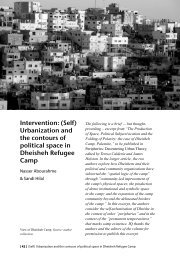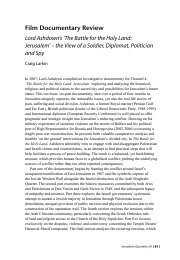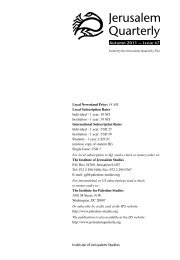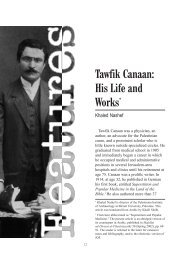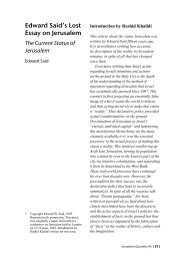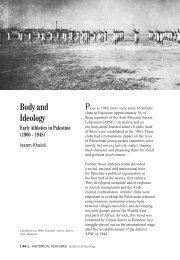PLUNDERING PALESTINE - Jerusalem Quarterly
PLUNDERING PALESTINE - Jerusalem Quarterly
PLUNDERING PALESTINE - Jerusalem Quarterly
Create successful ePaper yourself
Turn your PDF publications into a flip-book with our unique Google optimized e-Paper software.
etween states for war-related damages. The German Holocaust reparation schemes<br />
laid out a new precedent whereby individuals received reparations for mass human<br />
rights violations directly from the responsible state. 7 The Holocaust reparation schemes<br />
provided restitution and compensation to victims and their heirs for a wide range of<br />
material losses and non-material damages, including lost opportunities. 8<br />
Numerous reparation programs have since been established in different contexts to<br />
provide redress to persons for past atrocities – ranging from an apology and one-off<br />
compensation payments to Japanese Americans interned by the US government on<br />
account of their race, to the property claims commissions in the Balkans following the<br />
ethnic cleansing of the 1990s. Reparation has become a central tenant of transitional<br />
justice and conflict resolution. The normative developments in the field of reparations<br />
culminated in the recent UN General Assembly’s adoption of the Basic Principles and<br />
Guidelines on the Right to a Remedy and Reparation for Victims of Gross Violations of<br />
International Human Rights Law and Serious Violations of International Humanitarian<br />
Law, which codified a comprehensive set of principles on the right of individuals<br />
and communities to reparations. The UN Principles and Guidelines on the Right to a<br />
Remedy and Reparation sets out the forms of reparation mentioned above: restitution,<br />
compensation, rehabilitation, and satisfaction and guarantees of non-repetition. 9 For<br />
illustrative purposes it is interesting to note that the UN document describes restitution<br />
as including “restoration of liberty, legal rights, social status, family life and citizenship,<br />
return to one’s place of residence, and restoration of employment and return of<br />
property.” 10<br />
Indeed, against these standards, it is assumed that a durable peace between Israelis and<br />
Palestinians should be predicated on individual justice. In addition to being granted<br />
the choice whether to repatriate home, individuals should receive reparations for<br />
their damages in order to satisfy all of their rights, resolve the wounds of protracted<br />
dispossession and denial, and move toward equalizing the relationship between Israelis<br />
and Palestinians. With respect to property losses inside Israel, this would mean that<br />
individual Palestinian landowners and their heirs should be able to directly claim<br />
restitution and/or compensation for their properties.<br />
Israel, however, has historically resisted the principle of individualized reparations,<br />
including individual compensation, out of concern that it would amount to an admission<br />
of wrongdoing. Israel also prefers to do away with Palestinian refugee claims quickly<br />
with as little material consequence as possible. In the first international peace process<br />
on the Arab-Israeli conflict in 1949, Israel offered to repatriate a limited number<br />
of Palestinian refugees and rejected out-of-hand property restitution. 11 It opposed<br />
compensation payments directly to individual Palestinians, and offered only to pay<br />
for select Palestinian land to a common fund. 12 The Israeli delegation took a similar<br />
position at the Camp David II summit hosted by US President Clinton in 2000, whereby<br />
<strong>Jerusalem</strong> <strong>Quarterly</strong> 33 [ 59 ]




![In Search of Jerusalem Airport [pdf] - Jerusalem Quarterly](https://img.yumpu.com/49007736/1/180x260/in-search-of-jerusalem-airport-pdf-jerusalem-quarterly.jpg?quality=85)
